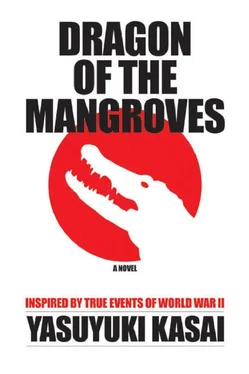However, he thought it too early to feel reassured, because he still didn’t understand how the British could have found them. He asked Shimizu about their respective positions before the battle and figured out that Murakami, who had casually carried his model thirty-eight cavalry carbine, had been on the end of the line. Sumi guessed that his rifle might have attracted the attention of the British, who had caught up with Murakami.
But Sumi doubted it soon, telling himself, “Could they tell the difference between rifles from a distance? Wasn’t a man with a Japanese rifle always a Japanese soldier, even if they could?”
Then he happened to look at Murakami’s feet and was astonished. Despite Sumi’s order to disguise himself as a Burmese, Murakami had worn a pair of rubber-soled canvas tabi, traditional footwear made with a split between the big toe and the second toe, with wrapped puttees under his lungi. He might have thought it convenient for mountain walking. Sumi deduced that the very characteristic Japanese footgear had no doubt attracted a quick British eye.
Though they were Asians, the Burmese or Gurkhas didn’t wear those shoes.
“Why didn’t I see this before? Had I checked their disguises more thoroughly, it might not have happened. Was it an avoidable death?” Sumi said to himself, suffering badly from guilt.
Abruptly, Arima’s voice cut in. “Take a look at this, Lieutenant.”
Arima pointed to one of British sacks. “They’ve shot birds,” said Arima.
Amazingly, a dead pheasant-like bird fell out of the sack. Arima had also found a shotgun lying on the ground nearby, and a pouch full of bird shots. Per-haps off-duty servicemen had come into this mountain by chance to hunt birds along the same road. He didn’t relax until he knew they were not trackers.
But the soldiers gathering there were astounded to know the opponents against whom they fought, at the risk of their lives, had diverted themselves in leisure.
“Bird-shooting during a war! Incredible!”
“What on earth are these Engli bastards thinking?”
“They simply want to kill more. We Japanese aren’t enough to satisfy them.”
Clamoring one and all, they openly vented their anger.
The British forces in the Burma front had kept back the white men in relatively safer zones and used colored troops like Sikh, Punjabi, Dogras, or Gurkhas as their shields. But those British had come all the way into such a backland only to shoot birds. The enemies might assess the Battle of Ramree had nearly ended, and they possibly roamed around the whole island freely. Sumi got anxious and fretfully ordered their departure.
Shimizu drew closer. “What do you think you are doing?” Shimizu protested.
“We must bury Murakami.”
Anger and remorse had already turned Shimizu’s face red.
Sumi wanted to do so as well. And he knew that Shimizu, the drillmaster, had treated Murakami exceptionally kindly, as the two came from the same district.
But it was dangerous to stay much longer there. After hearing sounds of the gunfight, enemy reinforcements might be on the way. Thinking of that possibility was very unsettling. How many men, including himself, should get killed to bury Murakami?
Sumi said, “I’m sorry for him, but every second counts now. We’re in a hurry.”
“What did you say? We’re in a hurry? If we’re so…”
Although Shimizu had shut his mouth, Sumi understood what he wanted to say: If they were in a hurry, they had better force their way through Ramree Town. Even so, this chicken commander stupidly made a detour through the woods and threw them into these dire straits, after all. This cowardice caused Murakami’s death—or something to that effect.
But Shimizu couldn’t put handle any more, and he said harshly, “Are you leaving him unattended? That’s too far! I never allow such heartless treatment!”
It was no way to talk to an officer, but all military ranks were pushed aside for the moment. Sumi had been disgusted with Shimizu’s insolence many times, but he knew he couldn’t get angry under the circumstances.
“Do as you like,” Sumi said upon seeing the stiffened face of Shimizu.
Then he beckoned the other members and said calmly, “Help Sarge, everybody.”
Sumi’s response surprised Shimizu, who had a look of puzzlement. But he turned and began the burial.
They had no shovels or picks, so it was quite laborious to dig a hole. Scraping off the ground with a bayonet or a billhook, everybody raked out the soil with his hands. Most soil in that woods was humus, fortunately, and they managed to make a hole sufficient for one man. Once they had set Murakami in it and covered him with Ramree soil, the sun was setting.
Pondgi plucked some nameless roadside flowers, then started chanting an unknown sutra in Burmese. His distinctive religious attitude made the funeral look better.
The Sumi rescue party set off for Yanthitgyi again; after all, its members had paid a silent tribute to Murakami’s spirit.
The forestry road sloped gently down toward Payadgi Plain. The sunlight gradually grew weaker, telling them dusk was nearing.
At the front of the line, Sumi walked quietly, except for short stops to check their present position with his compass. He ordered each soldier to wrap his firearm in a rag. He also put Yoshitake, who had combat experience and physical strength, at the end of the line and made him guard against an attack from the rear.
Everyone seemed fatigued, both in mind and body.
Sumi heard Morioka mutter to himself, “I wonder what comes to enemy soldiers if they land on Awaji Island or somewhere else in Japan in small numbers.”
“Where is Awaji Island?” Arima asked.
“Awaji is the biggest island in the Inland Sea of Japan and is as big as Ramree Island. It’s very famous. You really don’t know about it?” Morioka said.
“No. What’s so wrong with it?” retorted Arima.
Shimizu said, “Of course, they’d be captured or killed by local police or Army.
But what are you trying to say, Morioka?”
Morioka answered, “I mean we’re now in a similar situation.”
“Yeah, it’s a nasty state. We have to look after ourselves,” Arima said in agreement.
Sumi thought they were right. They could have gotten firepower support from other units if they’d been in normal action. But they now were completely isolated in this island overrun by enemies. Besides, their own firepower was very weak. Although they had managed to make it through the previous encounter, everybody had chalked it up to luck. At the same time, they’d been made acutely aware of the limit of their firepower. The British group had been small by chance.
But if they had taken on a platoon or more, no one would have survived. It was quite natural to get demoralized. The gunfight had also cast another shadow, other than Murakami’s death, on them all.
It was easy to explain their rescue mission but hard to promote. Sumi recognized the difficult task anew.
As long as they walked on that road, they ran the risk of encountering enemies. Sumi knew it was dangerous and instead took a route through the jungle.
More than a few drooped their shoulders upon starting this sudden
bush-wading. “Keep it up. It’s not so far,” Sumi called out, trying to raise their spirits. “We’ll take a rest after we’ve cleared this jungle.” Wielding a billhook, Sumi kept cutting through the thicket, but he also had been tired out.
Upon exiting the jungle, they came to a thin coppice comfortably exposed to the declining sun. Everyone heaved a sigh of relief. A refreshing breeze wafted through the coppice and cooled everyone’s flushed skin. But branches and leaves grew sparse overhead, offering them little cover from above.
Читать дальше












